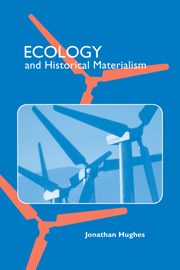Book contents
- Frontmatter
- Contents
- Acknowledgements
- Introduction
- 1 Ecological problems: definition and evaluation
- 2 Marxism and the green Malthusians
- 3 Marxism and the ecological method
- 4 Historical materialism: locating society in nature
- 5 Development of the productive forces
- 6 Capitalism, socialism and the satisfaction of needs
- Conclusion
- References
- Index
3 - Marxism and the ecological method
Published online by Cambridge University Press: 22 September 2009
- Frontmatter
- Contents
- Acknowledgements
- Introduction
- 1 Ecological problems: definition and evaluation
- 2 Marxism and the green Malthusians
- 3 Marxism and the ecological method
- 4 Historical materialism: locating society in nature
- 5 Development of the productive forces
- 6 Capitalism, socialism and the satisfaction of needs
- Conclusion
- References
- Index
Summary
It has been a contention of Marx's green critics that Marx makes metaphysical assumptions that are, or uses a method that is, inadequate for comprehending ecological problems. Such an assessment could be invoked on its own, as a free-standing criticism of Marx's method, but is more commonly proposed as an explanation for the alleged ecological insensitivity of Marx's more substantive claims.
The previous chapter demonstrated that simply invoking the notion of ‘limits to growth’ is not sufficient ground for rejecting Marx's theory. An ecological assessment of historical materialism requires a more subtle analysis of the interactions between nature, society and technology, which together determine the position and character of any limits. The methods of investigation and forms of explanation that Marx brings to bear on this interaction must therefore be subject to scrutiny, alongside the criticisms and counter-claims of his green critics. In order to proceed with this investigation answers to two questions will be required:
To what extent are the methodological and metaphysical claims of green theorists justifiable on philosophical and ecological grounds? and
How do these claims (insofar as they are justifiable) relate to Marx's theory?
In this chapter I will restrict myself to discussion of the forms of explanation and modes of investigation most appropriate to the study of ecological issues; the more substantive questions about the relation between human societies and non-human nature will be addressed in the following chapter.
- Type
- Chapter
- Information
- Ecology and Historical Materialism , pp. 64 - 85Publisher: Cambridge University PressPrint publication year: 2000



